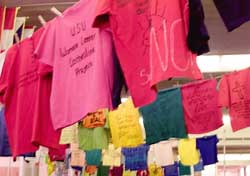Shirts share stories
Clotheslines strung in the International Lounge of the Taggart Student Center have been displayed as part of Domestic Violence Awareness Month.
For 10 years the Women’s Center at Utah State University has displayed laundry hung on clotheslines, educating the community about domestic violence. Battered women, friends and family of victims, have shared their messages through these clothing pieces.
Janet Osborne, director of the Women’s Center, said the center started the clothesline project after researching it. The metaphor and the message was a powerful learning tool for many people and “an effective medium,” she said.
“Women used to communicate while hanging their clothes,” Osborne said. “This gives abused women a voice.”
The abused women write, draw and color on shirts at the Women’s Center, anonymously. Once the center has the shirt, it becomes the center’s property.
Each shirt looks different from the next, with many messages being shared to the public and a point is being made.
In 1993, 40 shirts were displayed. This year, the display has over 100 shirts.
Osborne said they only censor the perpetrator’s name and race, for legal reasons. She said besides the two reasons, they do not censor any of the rest of the victims’ messages.
“They have a way to express what they feel,” Osborne said. “Some people might find it offensive, but then abuse is offensive.”
Quintin Beazer, a senior majoring in English literature and international studies, said he used to work at a battered women center and knows women who are victims.
“I think it is offensive not to let victims express their pain,” he said. “I’m a pretty conservative guy, but this message is important.”
Beazer said men not familiar with battered women should educate themselves to know what they go through. Men who “have been awakened” to abuse need to know how to stop it, he said.
Osborne said it affects men in many ways. She said even if he is “a good man, his partner or friend might be a victim.” He should know what she’s going through.
Because the clothesline is part of Domestic Violence Awareness Month, which honors women, men are not allowed to participate.
“I would like to find a project where we can include men,” she said. “I’m open for any ideas.”
Julie Hollist, a journalism and communication adjunct instructor and the director of marketing and communications for the Cache Valley Center of Arts, said she asks her students to visit the clothesline project to see individuals behind certain groups.
She said her students need to be aware of what is out there and what people go through in the real world.
“As PR people we lose sight of who people are,” she said. “We see people clumped in one group.”
It is important for her students to “recognize individual faces” beneath each group.
“We need to step outside our comfort zone,” Hollist said. “A lot of things that happen are not pretty. Unfortunately some (students) are victims themselves.”
Katy Wassom, a junior majoring in family human development, said she went to the display for a class.
She said it was sad to know all of it was “real life.”
“It’s crazy how many people in the valley had this happen to them,” Wassom said. “[It’s] tragic [that] people have to experience that.”
Wassom said she was glad she had the opportunity to view the display. She said it is important for people to open their minds.
Osborne said the center “facilitates and encourages” the experience outside of class. USU’s faculty has been very supportive, she said.
“It’s an opportunity to educated important issues such as domestic violence and sexual assault, which is important that we talk about,” she said.
Osborne said as the project educates it continues to help the victims.
“It’s a process about healing,” she said. “For someone who hasn’t been there and doesn’t understand the healing process, it’s a hard thing to understand.
-srkrebs@cc.usu.edu

Shirts scrawled with messages are strung through the TSC International Lounge. The Clothesline Project pleads through the words of women survivors of violence to “break the silence.” The shirts have hung the entire week. (Photo by Michael Sharp)

